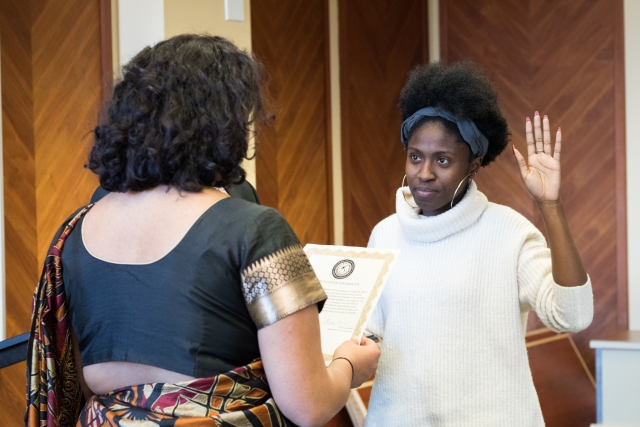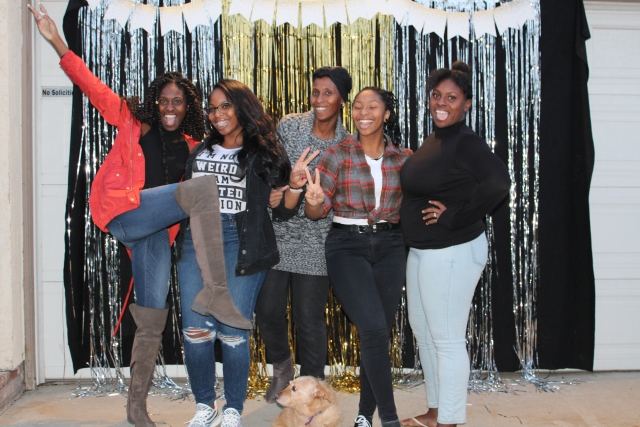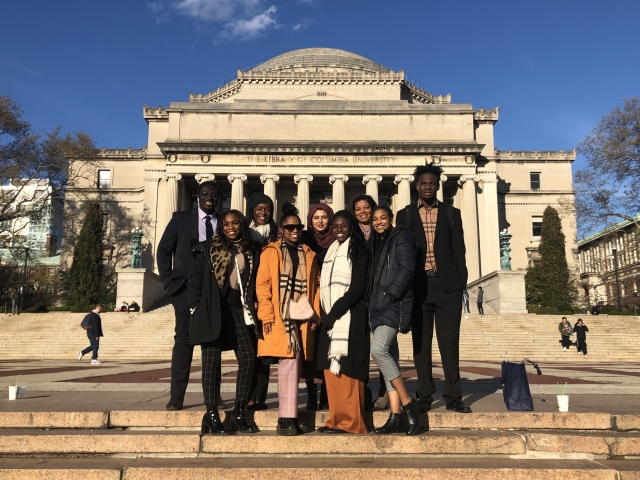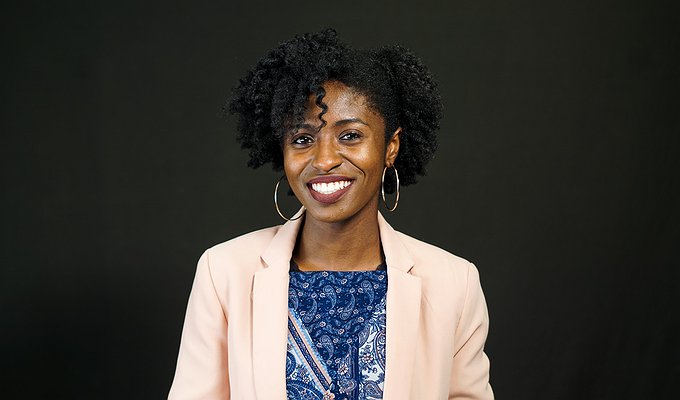Black students, Chancellor May, discuss facing discrimination, finding community
In the ASUCD Winter 2019 Elections, Shondreya Landrum won a seat on the Senate table. The ASUCD Elections website, which uses a ranking system, asking students to rank their top choices — up to six people — in numerical order for Senate positions. At the time, Landrum not only received the highest amount of #1 votes, she also made history for receiving the most overall votes for an ASUCD senator in recent memory — 863 students ranked Landrum as their top choice.
Eight hundred and sixty-three is almost equal to the number of Black students on the UC Davis campus. This landslide win was more than just something Landrum could add to her résumé. When only 1,096 undergraduate students identify as Black or African American, this accomplishment was not just Landrum’s, but the Black community’s. And even though Landrum does not speak for every Black student on the UC Davis campus, her experiences are reflective of many of those of her peers.
“I ran because every time we would have a [Black Student Union] event, every time we would come into safe spaces, there was always an issue,” Landrum said. “Why are we going to a school where not everyone is accepted?”

Landrum was born in San Diego, the fifth daughter of Mel and Ken Landrum, who met in the early ‘90s in Wisconsin, where Ken worked at a local Pick ‘n Save and Mel worked for Airborne Express. The Landrums moved their family to San Diego before Shondreya — or Shonna — was born.
In San Diego, Landrum was part of the first class to graduate from Chula Vista Learning Community Charter School. In high school, she was the president of the Associated Students Union twice, was on the cheer team and served as Senior Class President. Her high school involvement only foreshadowed what was to come.
For Landrum, the decision to come to UC Davis was an easy one. The academics, reputation and proximity to the State Capitol made it an attractive option. After her first tour, she knew that the competitive attitude that permeated her high school was not something she would have to endure at UC Davis. She did consider attending a historically Black college or university (HBCU) and thinks she might like to attend one for law school in the future.
“I felt like everyone was just so nice to me,” Landrum said. “I actually felt like I could talk to people and feel comfortable.”
Landrum is just a few quarters away from earning two degrees, one in political science-public service and the other in cognitive science. She is also pursuing a minor in gender, sexuality and women’s studies. Out of her immediate family, she will be the first one to graduate with her bachelor’s degree, though some of her older sisters are in community college right now. Her mother has an associate’s degree, and her father was a year away from earning his bachelor’s degree, but after sustaining a football injury, lost his scholarship. Landrum’s little sister, Darvy, is following in Shonna’s footsteps by playing volleyball and “doing everything under the sun.”
“[It feels] good because it’s nice that I’m able to do something that nobody else was able to fully get to or actually accomplish, but at the same time, it sucks,” Landrum said. “My sisters are so intelligent. They could have been the first ones to graduate, but everybody had things in their life happening, and that deterred them.”
“I still felt very isolated.” Adjusting to life in Davis
Destanie Smith, like Landrum, was also the first in her family to graduate from college. A UC Davis graduate who majored in religious studies and biological sciences, Smith once seriously considered attending an HBCU — she was accepted to Howard University and Spelman College — but UC Davis’ academic opportunities were more attractive.
“I just figured that growing up in high school, middle school, I was always put in classes where I was kind of the minority anyways, so I figured it wouldn’t be as bad coming to a college campus,” Smith said.
Choosing to attend UC Davis is an easier feat than adjusting to living in Davis, where Black students are confronted with a culture shock of sorts. At UC Davis, only 4% of students identify as African American or Black.
“[Transitioning to UC Davis] was difficult because although I met a lot of people, I still felt very isolated,” Landrum said. “At least in San Diego, even though I was still one of the only two Black people that went to my school, I had my family to go home to at night to take that burden off. I didn’t know why I was sad. I didn’t know why there was an issue until I actually went to a [Black Student Union] event.”
This feeling of isolation is not exclusive to the students at UC Davis. Chancellor Gary May, who graduated from Georgia Tech in 1985, had a similar experience.
“African Americans were significantly underrepresented,” May said. “I think we were, at that time, 6 or 7% of the student body, which probably sounds good compared to Davis, which is 4%. It wasn’t a new experience for me being in a classroom or a lab full of students who did not look like me.”
To combat this feeling of isolation, some students, like second-year political science-public service major Ayiana Keith, choose to live on the African American Living Learning Community floor in Student Housing during their first year. There, Keith found her community and a group of friends that she continues to live with today.
“It was definitely a big culture shock when I first got here,” Keith said. “Like, I knew I wasn’t going to be around a lot of Black people, but literally, there’s nobody here. I don’t see myself. Oftentimes, I’m the only Black person in [my] class.”
Smith, who came from a diverse high school in San Diego, also wasn’t prepared for the culture shock she would feel at UC Davis. She did, however, eventually find her home in the Turtle House, a co-op style living space on 2nd Street. Turtle House is home to 20 people — some students, some young professionals — all committed to living together in a creative, harmonious space. Their blue house, with chickens and often someone playing guitar in the yard, is named for the suspended turtle statue hanging above the porch and is known for their house shows and large, family-style dinners.

“I feel like I’m in a safe space there,” Smith said. “You don’t feel that sense of comfortability everywhere. No one’s ever really judgmental there.”
“I am most definitely hyper aware of how to present myself.” Life on campus
Banks, who chose UC Davis because it was the furthest school from her hometown of Bakersfield, California, did not find community in a traditionally Black space, but rather in the California Aggie Marching Band, formerly known as Band-Uh!
“I always have people to talk to and I like to keep things close and so I did find that [closeness] there,” Banks said. “It’s not diverse at all, but they do give me the space to push back on that.”
Banks pointed out to band leaders that their music folders did not feature any songs written by an artist of color.
To Black and African American students, being faced with prejudice, even on a campus that prides itself on diversity, is inevitable. Not everyone will find a space where pushing back is welcomed. Black students are faced with the struggle to not only exist, but to be exceptional and the knowledge that people’s eyes are always on them.
“I am most definitely hyper-aware of how to present myself in every sphere that I am in,” Landrum said. “I’m always on my P’s and Q’s […] because if you slip up, especially as a Black woman, you get screwed.”
Many students are faced with stereotypes and microaggressions because of their race or ethnicity. Smith recalls having been asked at least once per quarter if she was in the right class, or if her acceptance to UC Davis was contingent upon athletics, especially when asking for help from faculty.
“I often get asked, ‘Oh, what sport do you play?’” Smith said. “That all comes with the territory.”
Smith often had to explain that she wasn’t attending office hours because she was on the basketball team, but because she just needed help on different class concepts.
Although no longer a student, even May has experienced microaggressions in the professional spaces he navigates as chancellor of the university.
“[At] my first meeting of our Athletic Conference presidents, everybody’s introducing themselves, and I say, ‘I’m Gary May from UC Davis,’ and one of the other presidents says, ‘and what is your role at UC Davis?’” May recalled.
Banks, now in her fourth year, reflected on the low numbers of students of color and Black students at UC Davis. She said “a lot of Black people think that they need their body to get into college,” and, “typically,” sports are the way to go to a top tier school.
Racism in the community
Fourth-year human development major Jamarca Banks has been subjected to overt racism in the City of Davis. Twice, she has been called the “N-word,” once by a group of white men in a pickup truck with an American flag and twice by a white colleague.
“When I heard the one by the guys in the truck, it shook me to my core,” Banks said. “[When my colleague said it to me], I didn’t think anything of it until months later. I knew it wasn’t okay at the moment, but then it really hit me that someone actually had the audacity to say it to my face multiple times.”
Banks is not alone in being subjected to overt racism and harassment on campus.
On his first day at Georgia Tech in the early 1980s, May moved into his dorm room to find that he and his roommate, Chip, had both been subjected to overt racism.
“[His name card said] Chip is an N-word lover, so that was my introduction to the campus,” May said.
Incidents of racism and white supremacy are not uncommon on the UC Davis campus. Last October, The Aggie reported that 25 staff and students linked to the African American studies and political science departments received an email containing the message “It’s okay to be white.” The next week, a student reported that the fifth floor of the Death Star had been vandalized with two discrete N-words. This is on top of countless incidents of anti-Semitism on campus.
“The students who have grown up more within their culture […] want to feel safe on campus and I don’t think UC Davis has done the best to provide that, truthfully,” Landrum said.
May argued, however, that the university walks a fine line between protecting students to the best of its availability and preparing students for the difficult situations they will inevitably face after graduation.
“I think we are doing quite a bit, but we’re never going to be different from society at large,” May said. “I straddle this line between wanting the students to feel safe and wanting them to be able to function in society. So, it’s a difficult balance.”
“We are a very strong community.”
Landrum and her ASUCD staff were tasked with making a video for UC Davis’ Orientation aimed at Black students to inform them of different resources and opportunities. Mostly, the video aims to make sure that incoming Black students feel seen. Keith, Landrum’s chief of staff, took the lead on the video.
“[This video is for] when they come in, they can look at Black students and they will see, these are Black students and here’s what they’re doing on campus,” Landrum said.
Landrum wants more attention paid to what Black students are accomplishing on campus. For example, the Black Pre-Law Association went on a fully funded trip to Columbia University for the Black Pre-Law Conference, and the Black Engineers Association hosted a state-wide conference at UC Davis.
As a senator, Landrum worked last summer to secure more space for the Center for African Diaspora Student Success (CADSS). After ASUCD dissolved the Experimental College, Landrum took advantage of the opportunity and worked to double the amount of space dedicated to CADSS.
“They have been fighting for more space since they got the space [they’re in now], but CADSS was literally put on the list last,” Landrum explained. “It was extremely difficult because even though there aren’t many Black students on campus, we are a very strong community. And we do like being with each other. And we do like having a safe space to be on campus with each other.”

Landrum has spent much of her time on the Senate table advocating not only for her own community, but for all underrepresented communities. The ASUCD Senate table is often divided, but it was Landrum’s reputation for communicating with students and her ability to work across the aisle that won her the election.
Before the COVID-19 outbreak, Landrum planned to host an ASUCD banquet that would invite alumni and different ASUCD units to come together and raise money for the association. Alumni would be given the opportunity to reacquaint themselves with the different programs and initiatives spearheaded by ASUCD.
Former ASUCD Vice President Shreya Deshpande admires Landrum’s ability to ask the right questions: “What can I do for you? What are the issues that you need addressed? And how can I make sure that you’re feeling represented and feeling heard?”
These questions are especially important when the table’s discussions are focused on police brutality and the Blue Lives Matter flag, on allocating funding and space to different commissions and committees or processing instances of hate and racism on campus.
“She won the election by a freaking landslide,” Deshpande said. “The way she humbled herself, and continues to humble herself at the table, shows [that she is someone] in power, using her power, to be able to create that space.”
That effort to create space was recently acknowledged by the Black Student Union. Landrum was awarded the Helping Hand Award for the second year in a row.
Landrum plans to take the lessons she’s learned through her internships, her time at the Senate table and what she learned at the Black Pre-Law Conference to law school. Even if she doesn’t attend an HBCU — though she would love to — she is confident that she will thrive, regardless. Being a Black woman at UC Davis has taught her to thrive in the face of adversity.
“At the end of the day, I’ve pulled through and the most challenging times were in places where it was very unlikely for me to succeed,” Landrum said. “But I did it.”
Written by: Liz Jacobson — arts@theaggie.org




